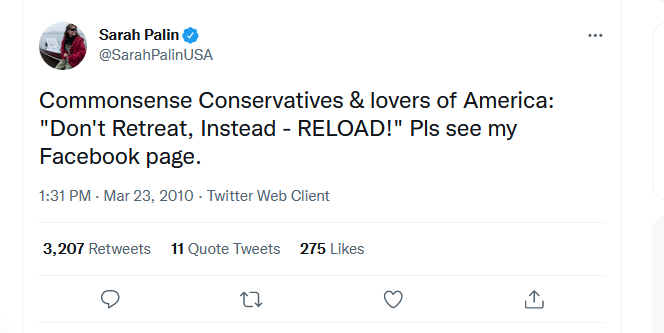
Good morning from New York.
Sarah Palin's testimony continues in her lawsuit against the New York Times.
I'm covering the proceedings for @LawCrimeNews.
Sarah Palin's testimony continues in her lawsuit against the New York Times.
I'm covering the proceedings for @LawCrimeNews.
During pre-trial arguments, the NYT's lawyer argues that someone known for saying "Don’t retreat, reload" will have a hard time arguing that she sustained emotional damage in the face of criticism about her gun rhetoric.
The NYT wants to grill Palin on rhetoric like that to establish that Palin "plays in the public field" and "uses hyperbole" to make her points.
Judge Rakoff says he'll allow it.
Judge Rakoff says he'll allow it.
Everyone rises, and Judge Rakoff sends in the jury.
Palin returns to the witness box.
Today's testimony continues with more biographical details, including her education (journalism degree from the University of Idaho).
Testimony then turns to Sarah PAC.
"Sarah PAC was Sarah, Sarah Palin. It was the tool, the forum, to have my voice heard."
Testimony then turns to Sarah PAC.
"Sarah PAC was Sarah, Sarah Palin. It was the tool, the forum, to have my voice heard."
Palin says that the Tucson shooting was "a huge concern to me personally."
Asked about her response to being blamed for it, she responds: "I wasn't going to politicize, like the way the media was politicizing at that time, the deaths of a 9-year-old girl."
Asked about her response to being blamed for it, she responds: "I wasn't going to politicize, like the way the media was politicizing at that time, the deaths of a 9-year-old girl."
Palin:
"I just felt for the family more than I could express. Also the federal judge."
She rattles off the names of the other victims.
"I felt for them, and I wanted to get the message out that there needed to be fairness."
"I just felt for the family more than I could express. Also the federal judge."
She rattles off the names of the other victims.
"I felt for them, and I wanted to get the message out that there needed to be fairness."
Palin:
"It was mortifying because I knew what the truth was."
Asked whether the blame affected her, she says: "Absolutely, the death threats really ramped up. Disturbing death threats against my children. There seemed to be a campaign out there from my daughter, Piper."
"It was mortifying because I knew what the truth was."
Asked whether the blame affected her, she says: "Absolutely, the death threats really ramped up. Disturbing death threats against my children. There seemed to be a campaign out there from my daughter, Piper."
Palin:
"I feared for my family's safety and my supporters' safety because of those threats."
"I feared for my family's safety and my supporters' safety because of those threats."
Loughner's nine-year-old victim was Christina-Taylor Green, and Palin said that some wanted her daughter Piper to be harmed in the same way.
* Unclear what she said, but it's clear that the meaning was "for," not "from."
I'll check the transcript.
I'll check the transcript.
Right now, Palin's testimony is about the immediate aftermath of the 2011 Loughner shootings—well before the NYT editorial.
Palin, pressed by the judge, claims that the NYT linked her to incitement before the editorial at issue.
She can't specify what.
NYT moves to strike.
Palin, pressed by the judge, claims that the NYT linked her to incitement before the editorial at issue.
She can't specify what.
NYT moves to strike.
The parties are at sidebar because Palin just alleged a generic, amorphous claim against the NYT not specified in her defamation case — essentially accusing the paper of linking her to incitement before the 2017 editorial that's the subject of this lawsuit.
Reminder:
The testimony so far has not touched upon the NYT's "America's Lethal Politics" editorial. These are her grievances against the media writ large for linking her to the Loughner shooting post-2011.
NYT wasn't alone.
From 2011, 6 years earlier nydailynews.com/news/national/…
The testimony so far has not touched upon the NYT's "America's Lethal Politics" editorial. These are her grievances against the media writ large for linking her to the Loughner shooting post-2011.
NYT wasn't alone.
From 2011, 6 years earlier nydailynews.com/news/national/…
Unlike that Daily News editorial, the NYT later issued a correction over the false link.
(Long sidebar ends)
Rakoff explains to the jury why they took a long break to resolve legal issues.
Rakoff explains to the jury why they took a long break to resolve legal issues.
Questioning turns to the publication of "America's Lethal Politics" in 2017.
Q: Do you remember where you were when you first found out this editorial was being published.
A: No.
Q: Do you remember where you were when you first found out this editorial was being published.
A: No.
Palin:
"I remember feeling immediately, 'Oh, no.' First, in realizing how significant and horrible the incident was."
She says she was "mortified."
Asked if she was in politics at the time, she says: "No."
"I remember feeling immediately, 'Oh, no.' First, in realizing how significant and horrible the incident was."
She says she was "mortified."
Asked if she was in politics at the time, she says: "No."
Q: Was your profile as high?
A: Not at all.
After the editorial's publication, she says she thought: "Oh, no. Not again!"
A: Not at all.
After the editorial's publication, she says she thought: "Oh, no. Not again!"
Palin talks about defending Bernie Sanders after the 2017 shooting.
"I did not want to see more untruths printed. I wanted Bernie Sanders not to be blamed" in a "knee-jerk reaction," trying to "score political points" by those who wanted to "capitalize" on violence.
"I did not want to see more untruths printed. I wanted Bernie Sanders not to be blamed" in a "knee-jerk reaction," trying to "score political points" by those who wanted to "capitalize" on violence.
Palin says "the media" would let "no tragedy go to waste."
"The New York Times, the be all end all, the loud voice in media had already taken a knee-jerk reaction, and I felt [...] tried to score political points" over the "horrific violence."
"The New York Times, the be all end all, the loud voice in media had already taken a knee-jerk reaction, and I felt [...] tried to score political points" over the "horrific violence."
Palin:
"There was no mention of me in what they called a correction."
(NYT staffers previously testified that's by design: The paper doesn't want to compound the error to dragging out the person's name out with it.)
"There was no mention of me in what they called a correction."
(NYT staffers previously testified that's by design: The paper doesn't want to compound the error to dragging out the person's name out with it.)
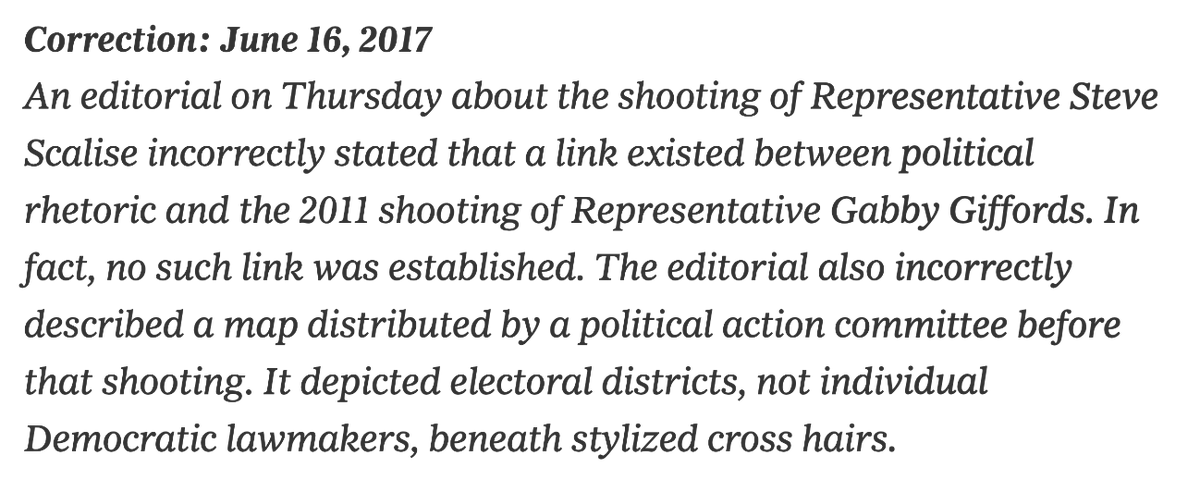
The NYT dropped language about the incitement, but Palin claimed that the after version wasn't much better:
"Nothing changed. They doubled down."
(See before and after.)

"Nothing changed. They doubled down."
(See before and after.)
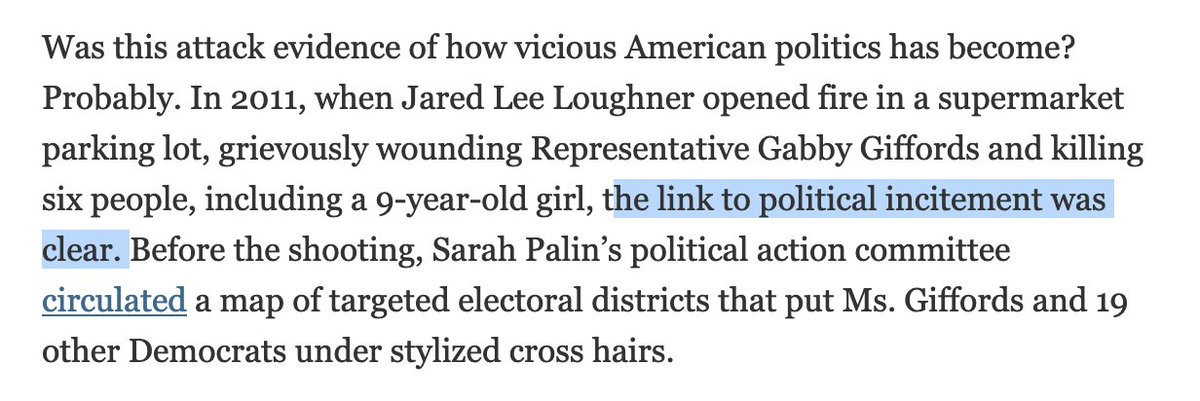
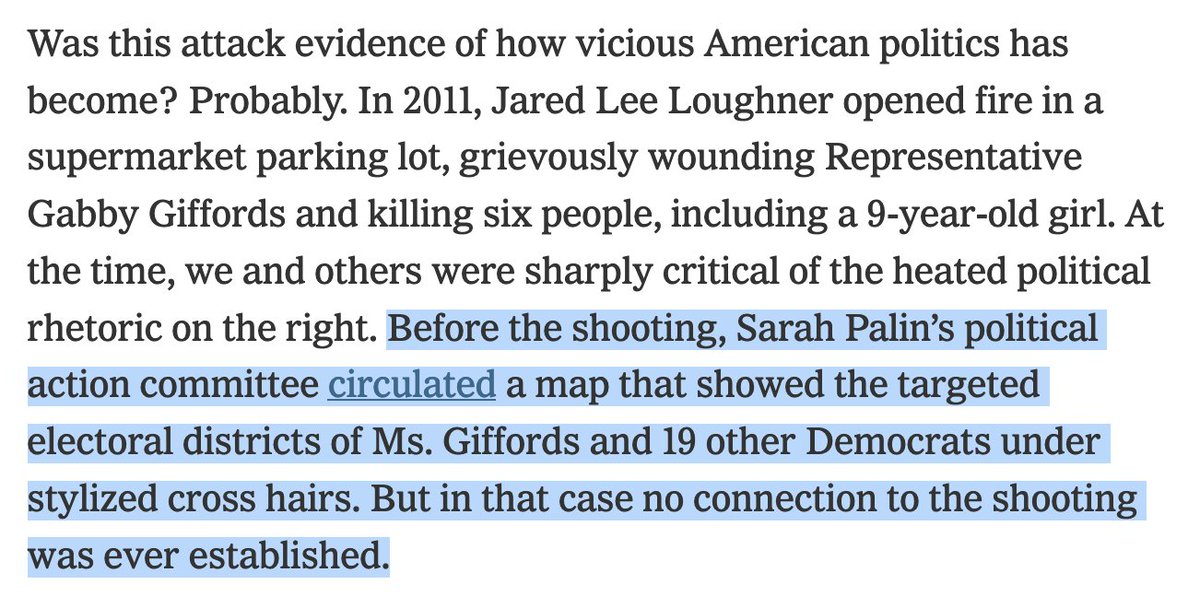
Palins says that she felt that the NYT was “Goliath” and she, representing “the people,” was “David.”
Palin: "There I was up in Wasilla, Alaska, up against those who buy ink by the barrel, and here I was with my No. 2 pencil."
On cross-ex, the NYT's lawyer presses Palin on her experiences facing criticism in the political arena.
Q: You have felt political animus from the political left since the 2008 election.
A: Some.
Asked if she's been described as "polarizing," she responds: "I've heard that."
Q: You have felt political animus from the political left since the 2008 election.
A: Some.
Asked if she's been described as "polarizing," she responds: "I've heard that."
NYT's lawyer asks about her payment for her appearance on "The Masked Singer."
"It paid some bills," Palin acknowledges.
"It paid some bills," Palin acknowledges.
Q: You have 1.3 million followers on Twitter?
A: I don't know. I don't tweet.
NYT's lawyer shows her the account. She acknowledges it shows just that—and her infrequent tweeting.
A: I don't know. I don't tweet.
NYT's lawyer shows her the account. She acknowledges it shows just that—and her infrequent tweeting.
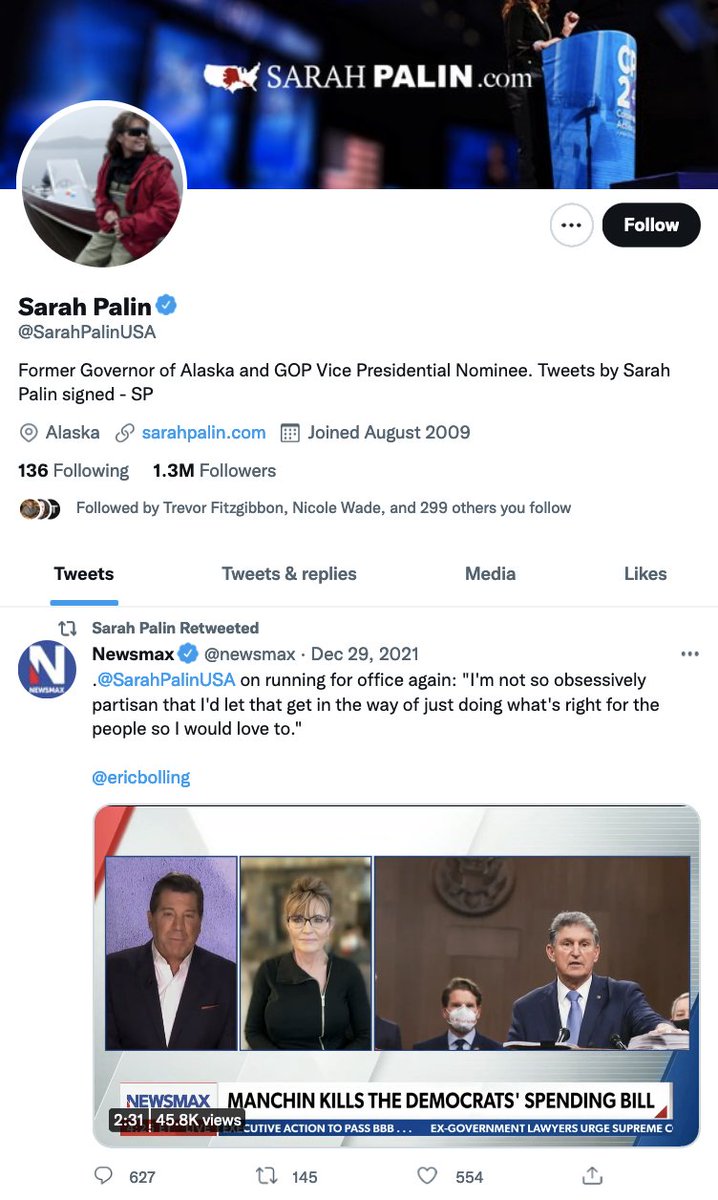
NYT's lawyer says that she'd agree the markings on the map look like crosshairs.
She responds a "reasonable person could and would" see it that way.
"They also look like other things that you could perceive those as, the surveyor markings"
She responds a "reasonable person could and would" see it that way.
"They also look like other things that you could perceive those as, the surveyor markings"
Morning recess.
After the jury leaves, Rakoff incredulously asks Palin about her comments that she doesn't dance or sing.
Rakoff: "You are missing one of the great joys in life. I am encouraging you to reconsider."
After the jury leaves, Rakoff incredulously asks Palin about her comments that she doesn't dance or sing.
Rakoff: "You are missing one of the great joys in life. I am encouraging you to reconsider."
Rakoff discloses that his wife, who is an "expert" in ballroom dancing, is in the courtroom.
Notably:
Palin appeared to describe little tangible impact from the 2017 editorial.
She testified about death threats **preceding** the 2017 editorial from the Loughner connection, but not about threats, lost wages, or other consequences—other than lost sleep—*following* it.
Palin appeared to describe little tangible impact from the 2017 editorial.
She testified about death threats **preceding** the 2017 editorial from the Loughner connection, but not about threats, lost wages, or other consequences—other than lost sleep—*following* it.
Her direct examination is over—and her lawyer spent little time trying to thread that needle.
We're back.
Questioning turns to Jan. 8, 2011, the date of the Loughner shooting.
Palin agrees that some in the press criticized her after that, and she put out a statement. The NYT's lawyer David Axelrod shows her the statement for identification.
It's received as an exhibit.
Questioning turns to Jan. 8, 2011, the date of the Loughner shooting.
Palin agrees that some in the press criticized her after that, and she put out a statement. The NYT's lawyer David Axelrod shows her the statement for identification.
It's received as an exhibit.
Q: Did you write this last statement?
She says yes, but adds a couple of people were helping her.
She says yes, but adds a couple of people were helping her.
Part of her statement:
"My heart broke for the innocent victims [...] We do mourn for the victims' families as we express our sympathies."
It also states.
"Vigorous and spirited debate during elections are among our most cherished traditions."
"My heart broke for the innocent victims [...] We do mourn for the victims' families as we express our sympathies."
It also states.
"Vigorous and spirited debate during elections are among our most cherished traditions."
Palin's statement at the time continued:
"If you don't like their ideas, you're free to propose better ideas."
It also, much more controversially, compared criticism of her to a "blood libel."
"If you don't like their ideas, you're free to propose better ideas."
It also, much more controversially, compared criticism of her to a "blood libel."
The "blood libel" was the antisemitic lie that Jews used the blood of Christian babies in their matzoh, leading to centuries of persecution and massacres against Jewish people.
Palin's invoking the phrase for herself sparked widespread condemnation. npr.org/sections/itsal…
Palin's invoking the phrase for herself sparked widespread condemnation. npr.org/sections/itsal…
Palin ducks a number of questions from the NYT's attorney about whether she meant "blood libel" to refer to news outlets tying her to the Loughner shooting.
She says it's about "the power of the pen, the power in words."
She says it's about "the power of the pen, the power in words."
Q: Did any journalists say 'Go out there and hunt Sarah Palin because of the crosshairs map'?
Palin says she's seen her face in crosshairs, "so yes."
Q: Who?
A: I don't have it in front of me, but I have years of that kind of graphic or statement or death threats.
Palin says she's seen her face in crosshairs, "so yes."
Q: Who?
A: I don't have it in front of me, but I have years of that kind of graphic or statement or death threats.
Q: Your use of the [phrase] "blood libel" created more criticism, yes?
A: Correct.
A: Correct.
Asked whether she hired a PR firm to repair her image after the Loughner controversy, Palin replies that she never hired PR firms.
It's not her practice, she said.
It's not her practice, she said.
Axelrod asked Palin whether one of her first reactions to the editorial was to consider a lawsuit.
She agrees: "I knew something had to be done."
She agrees: "I knew something had to be done."
The NYT's attorney David Axelrod refers to her tweet saying she's "exploring options" regarding litigation.
Before tweeting that, Axelrod asks: "You didn't reach out to the Times to ask for a correction, did you?"
She agrees she didn't.
Before tweeting that, Axelrod asks: "You didn't reach out to the Times to ask for a correction, did you?"
She agrees she didn't.
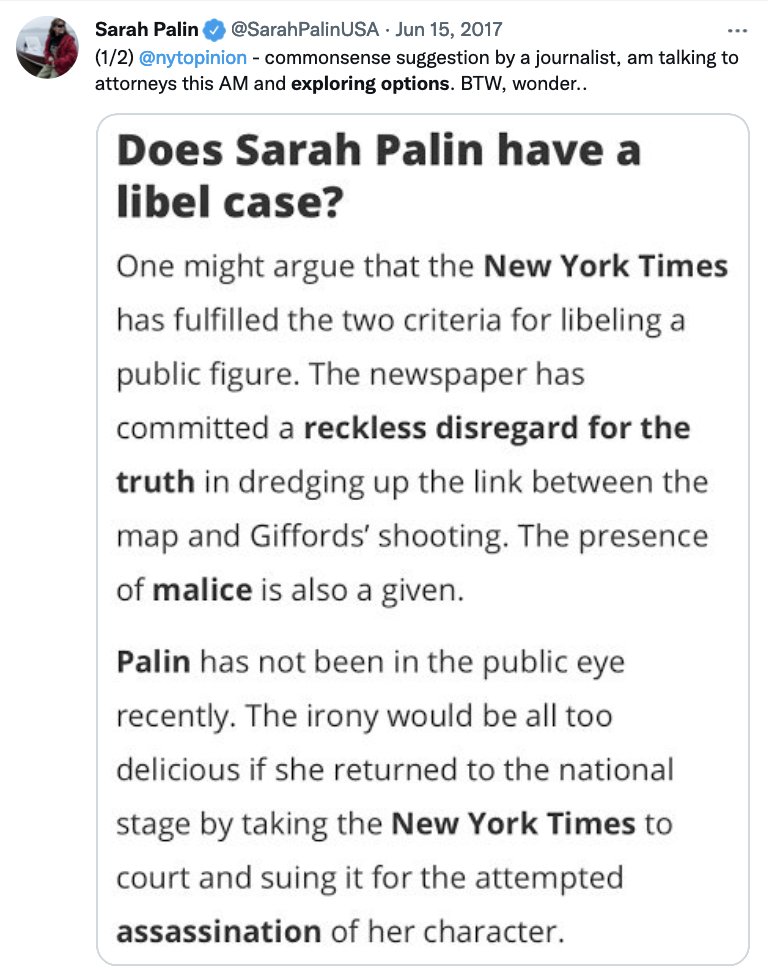
Palin:
"No, they just accused me of inciting murder. I didn't think I would get a friendly response."
Later:
"I did not personally reach out an unfriendly recipient of what I'd be requesting of them. It was common sense. They knew that they were printing an untruth."
"No, they just accused me of inciting murder. I didn't think I would get a friendly response."
Later:
"I did not personally reach out an unfriendly recipient of what I'd be requesting of them. It was common sense. They knew that they were printing an untruth."
Q: Fair to say, you never sought an apology from the Times, did you?
She didn't.
She didn't.
Palin quibbles over the language that she "circulated" the crosshairs map.
"It was on a website," she says, noting it was months before the shooting.
(No link was established.)
"It was on a website," she says, noting it was months before the shooting.
(No link was established.)
"Sarah Palin Tells a Jury That Her Defamation Suit Against the New York Times Is Just Like David vs. Goliath"
ICYMI: The story so far lawandcrime.com/high-profile/s…
ICYMI: The story so far lawandcrime.com/high-profile/s…
Axelrod asks her whether she recalls speaking to family about the editorial.
"As I sit here today, in the penalty box, I don't recall specifically," Palin said, amusingly referring to the Plexiglas enclosure that are witness stands in the age of COVID-19.
"As I sit here today, in the penalty box, I don't recall specifically," Palin said, amusingly referring to the Plexiglas enclosure that are witness stands in the age of COVID-19.
Q: In this case, you're not seeking to recover any lost income, correct?
A: Not lost income, but [...]
Rakoff interjects to tell the jury that it's a legal matter and not something sought in her lawsuit.
A: Not lost income, but [...]
Rakoff interjects to tell the jury that it's a legal matter and not something sought in her lawsuit.
Q: You can't identify anybody who's shied away from you as a result of the editorial?
A: I can't name names.
A: I can't name names.
Q: You can't specifically identify any candidates who's shied away from you as a result of the publication of the editorial?
She says generally "things changed" after the editorial.
She says generally "things changed" after the editorial.
"I can't specifically give you any name of someone who told me that they didn't want me to help them," Palin said.
Axelrod asked whether she spent any money on a PR firm or other such professional to try to repair Palin's reputation.
Palin's lawyer objects, asking for a sidebar.
Rakoff grants that request, and they huddle.
Palin's lawyer objects, asking for a sidebar.
Rakoff grants that request, and they huddle.
Confronting about her claim of lost sleep, Palin insists that it was "hard to lay my head peacefully on the pillow at night, yes."
Q: Did you see a doctor about that?
A: No.
Q: Did you take any medication?
A: No.
Palin: "I holistically remedied any issues caused by stress."
Q: Did you see a doctor about that?
A: No.
Q: Did you take any medication?
A: No.
Palin: "I holistically remedied any issues caused by stress."
Q: You believe Americans should have the right to voice their opinions, right?
A: Yes.
Q: Even if it's an unpopular opinion?
A: Absolutely.
A: Yes.
Q: Even if it's an unpopular opinion?
A: Absolutely.
Q: That's the beauty of the First Amendment, right?
A: Right.
She adds later: "As long as everyone's speaking truthfully."
A: Right.
She adds later: "As long as everyone's speaking truthfully."
Axelrod notes that part of the faith of the First Amendment is that the truth will eventually win out, setting the stage for his questions about the NYT's prompt correction.
Q: Gov. Palin, isn't it true that you've recently talked about running for office again?
Palin responds that: "The door's always open."
Palin responds that: "The door's always open."
NYT's counsel notes that, since the editorial, she's been Fox News and appeared on Turning Point USA.
She says she's appeared twice for the latter.
She says she's appeared twice for the latter.
Cross-examination ends.
Redirect by her lawyer begins.
Redirect by her lawyer begins.
Palin on her "blood libel" remark: "I did not expect that anybody would take such issue with it."
We resume after the lunch recess.
Palin's attorney asks her about "Don't retreat, reload."
"It was a bumper sticker on my dad's truck forever."
She credits it to her dad's motivational saying. Her parents were marathon runners, she says.
Palin's attorney asks her about "Don't retreat, reload."
"It was a bumper sticker on my dad's truck forever."
She credits it to her dad's motivational saying. Her parents were marathon runners, she says.
Q: Were sports important in your family?
A: Extremely important.
A: Extremely important.
Palin makes a passing remark about how the Times "circulated" their erroneous editorial.
(She previously claimed her crosshairs map wasn't circulated—because it was just put on her website.)
(She previously claimed her crosshairs map wasn't circulated—because it was just put on her website.)
Recross:
NYT's counsel says that Palin said in August 2021 that she contemplated running for office this year.
She reiterates she may have said at the time: "The door's always open."
NYT's counsel says that Palin said in August 2021 that she contemplated running for office this year.
She reiterates she may have said at the time: "The door's always open."
Palin notes she sued a couple weeks after the editorial.
She previously testified that she wasn't in politics at the time, but Axelrod has her acknowledge that she hit the trail with a couple Georgia senate candidates.
She previously testified that she wasn't in politics at the time, but Axelrod has her acknowledge that she hit the trail with a couple Georgia senate candidates.
Palin tweeted this a couple months after filing suit:
"Hitting the trail... stay tuned for details!"
"Hitting the trail... stay tuned for details!"
https://twitter.com/SarahPalinUSA/status/908353676523200512?s=20&t=3gIp4IXzq9mxgTmeqI9Omg
The link touted her bus tour with Judge Roy Moore. sarahpalin.com/2017/10967/gov…
Q: This was September 2017.
A: I think so.
Q: About three months after the publication of the editorial.
She acknowledged that's true.
She left the witness box after that question and answer, ending her testimony.
A: I think so.
Q: About three months after the publication of the editorial.
She acknowledged that's true.
She left the witness box after that question and answer, ending her testimony.
I deleted a tweet that summarized Rakoff’s quote as one about there being little evidence of Bennet harboring malice toward Palin. The words he used were “ill will.”
In defamation law, it’s an important distinction so summary doesn’t suffice.
In defamation law, it’s an important distinction so summary doesn’t suffice.
https://twitter.com/frankrunyeon/status/1491869471392346112
Both iterations of the quote—in summary and in verbatim—are bad news for Palin.
• • •
Missing some Tweet in this thread? You can try to
force a refresh

